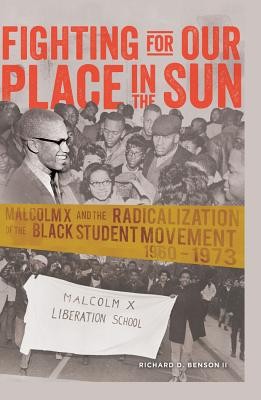
- We will send in 10–14 business days.
- Publisher: Peter Lang Inc., International Academic Publishers
- Year: 2015
- Pages: 305
- ISBN-10: 1433117703
- ISBN-13: 9781433117701
- Format: 15 x 22.4 x 1.8 cm, softcover
- Language: English
- SAVE -10% with code: EXTRA
Fighting for Our Place in the Sun (e-book) (used book) | bookbook.eu
Reviews
Description
In Fighting for Our Place in the Sun, Richard D. Benson II examines the life of Malcolm X as not only a radical political figure, but also as a teacher and mentor. The book illuminates the untold tenets of Malcolm X's educational philosophy, and also traces a historical trajectory of Black activists that sought to create spaces of liberation and learning that are free from cultural and racial oppression. It explains a side of the Black student movement and shift in black power that develops as a result of the student protests in North Carolina and Duke University. From these acts of radicalism, Malcolm X Liberation University (MXLU), the Student Organization for Black Unity (SOBU/YOBU), and African Liberation Day (ALD) were produced to serve as catalysts to extend the tradition of Black activism in the late 1960s and early 1970s. Scholars, researchers, community organizers, and students of African-American studies, American studies, history of education, political science, Pan-African studies, and more will benefit from this provocative and enlightening text.
EXTRA 10 % discount with code: EXTRA
The promotion ends in 16d.10:45:28
The discount code is valid when purchasing from 10 €. Discounts do not stack.
- Publisher: Peter Lang Inc., International Academic Publishers
- Year: 2015
- Pages: 305
- ISBN-10: 1433117703
- ISBN-13: 9781433117701
- Format: 15 x 22.4 x 1.8 cm, softcover
- Language: English English
In Fighting for Our Place in the Sun, Richard D. Benson II examines the life of Malcolm X as not only a radical political figure, but also as a teacher and mentor. The book illuminates the untold tenets of Malcolm X's educational philosophy, and also traces a historical trajectory of Black activists that sought to create spaces of liberation and learning that are free from cultural and racial oppression. It explains a side of the Black student movement and shift in black power that develops as a result of the student protests in North Carolina and Duke University. From these acts of radicalism, Malcolm X Liberation University (MXLU), the Student Organization for Black Unity (SOBU/YOBU), and African Liberation Day (ALD) were produced to serve as catalysts to extend the tradition of Black activism in the late 1960s and early 1970s. Scholars, researchers, community organizers, and students of African-American studies, American studies, history of education, political science, Pan-African studies, and more will benefit from this provocative and enlightening text.


Reviews